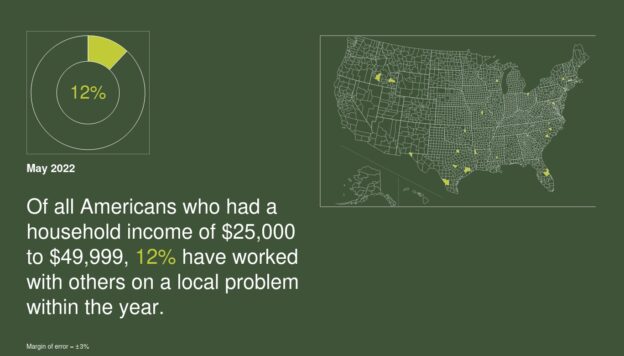- Facebook135
- Threads
- Bluesky
- Total 135
The Equity in America website is an experiment in data-visualization and public education. We have assembled a dataset with detailed information about the social conditions of thousands of Americans that we use for interdisciplinary academic research. We have also created a homepage where people who need no background at all in statistics can explore selected variables to help understand and debate equity in America. By clicking any pair of variables, you generate a graphic with a pie chart, a plain-language sentence, and a map.
We have just posted the latest wave of data, from 2022. I used it to check the percentage of people who live in America’s poorest ZIP codes who say they are involved in working with other people to address community problems.
This definition of civic engagement sets a fairly high bar, and only 9% report community problem-solving. However, our website also shows that the rate is 10% among all Americans and 10% in ZIP codes with incomes above the national median. In short, there is no significant relationship between community income and problem-solving. And 10 percent of American adults is about 25 million people–enough to get a lot done.
I illustrate this post with a slightly different graphic. It shows that the percentage of community problem-solvers in the household-income range of $25,000-$50,000 is relatively high, at 12%.
According to our data, the national rate of community problem-solving is down 3 points compared to 2021 (and the decline is outside the margin of error), but I’d want to look at a longer time-series than ours to get a sense of whether this rate fluctuates regularly or shows a meaningful trend.
Anyway, my main invitation is to explore the data with our user-friendly tool. You don’t have to be interested in civic engagement. It also presents data on pet-ownership, diabetes, COVID vaccination, and a diverse selection of other topics.
